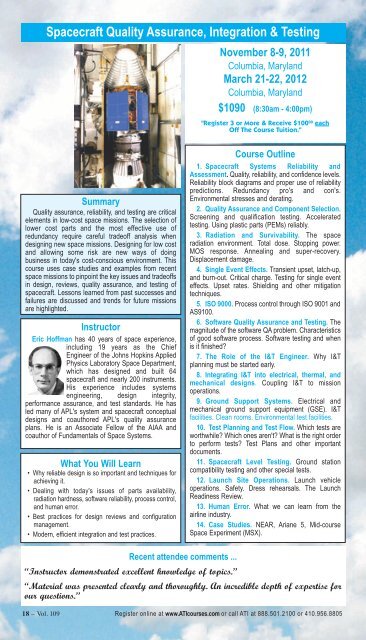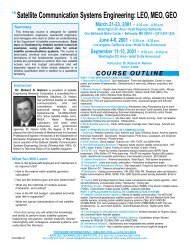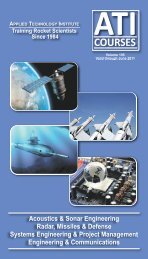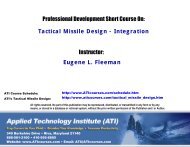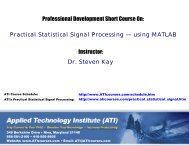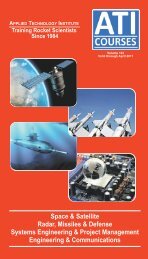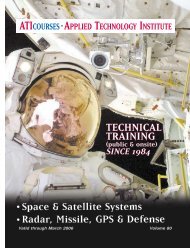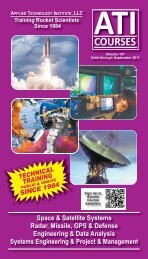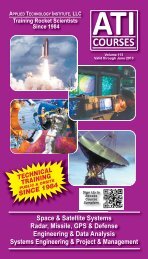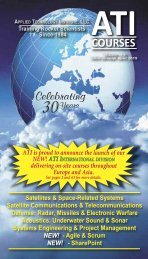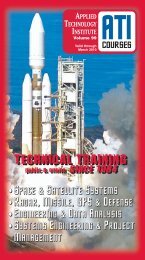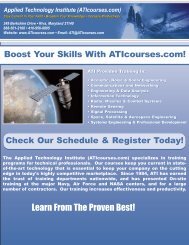Acoustics & Sonar Engineering Radar, Missiles & Defense Systems ...
Acoustics & Sonar Engineering Radar, Missiles & Defense Systems ...
Acoustics & Sonar Engineering Radar, Missiles & Defense Systems ...
Create successful ePaper yourself
Turn your PDF publications into a flip-book with our unique Google optimized e-Paper software.
Spacecraft Quality Assurance, Integration & Testing<br />
Summary<br />
Quality assurance, reliability, and testing are critical<br />
elements in low-cost space missions. The selection of<br />
lower cost parts and the most effective use of<br />
redundancy require careful tradeoff analysis when<br />
designing new space missions. Designing for low cost<br />
and allowing some risk are new ways of doing<br />
business in today's cost-conscious environment. This<br />
course uses case studies and examples from recent<br />
space missions to pinpoint the key issues and tradeoffs<br />
in design, reviews, quality assurance, and testing of<br />
spacecraft. Lessons learned from past successes and<br />
failures are discussed and trends for future missions<br />
are highlighted.<br />
Instructor<br />
Eric Hoffman has 40 years of space experience,<br />
including 19 years as the Chief<br />
Engineer of the Johns Hopkins Applied<br />
Physics Laboratory Space Department,<br />
which has designed and built 64<br />
spacecraft and nearly 200 instruments.<br />
His experience includes systems<br />
engineering, design integrity,<br />
performance assurance, and test standards. He has<br />
led many of APL's system and spacecraft conceptual<br />
designs and coauthored APL's quality assurance<br />
plans. He is an Associate Fellow of the AIAA and<br />
coauthor of Fundamentals of Space <strong>Systems</strong>.<br />
What You Will Learn<br />
• Why reliable design is so important and techniques for<br />
achieving it.<br />
• Dealing with today's issues of parts availability,<br />
radiation hardness, software reliability, process control,<br />
and human error.<br />
• Best practices for design reviews and configuration<br />
management.<br />
• Modern, efficient integration and test practices.<br />
Recent attendee comments ...<br />
November 8-9, 2011<br />
Columbia, Maryland<br />
March 21-22, 2012<br />
Columbia, Maryland<br />
$1090 (8:30am - 4:00pm)<br />
"Register 3 or More & Receive $100 00 each<br />
Off The Course Tuition."<br />
Course Outline<br />
1. Spacecraft <strong>Systems</strong> Reliability and<br />
Assessment. Quality, reliability, and confidence levels.<br />
Reliability block diagrams and proper use of reliability<br />
predictions. Redundancy pro's and con's.<br />
Environmental stresses and derating.<br />
2. Quality Assurance and Component Selection.<br />
Screening and qualification testing. Accelerated<br />
testing. Using plastic parts (PEMs) reliably.<br />
3. Radiation and Survivability. The space<br />
radiation environment. Total dose. Stopping power.<br />
MOS response. Annealing and super-recovery.<br />
Displacement damage.<br />
4. Single Event Effects. Transient upset, latch-up,<br />
and burn-out. Critical charge. Testing for single event<br />
effects. Upset rates. Shielding and other mitigation<br />
techniques.<br />
5. ISO 9000. Process control through ISO 9001 and<br />
AS9100.<br />
6. Software Quality Assurance and Testing. The<br />
magnitude of the software QA problem. Characteristics<br />
of good software process. Software testing and when<br />
is it finished?<br />
7. The Role of the I&T Engineer. Why I&T<br />
planning must be started early.<br />
8. Integrating I&T into electrical, thermal, and<br />
mechanical designs. Coupling I&T to mission<br />
operations.<br />
9. Ground Support <strong>Systems</strong>. Electrical and<br />
mechanical ground support equipment (GSE). I&T<br />
facilities. Clean rooms. Environmental test facilities.<br />
10. Test Planning and Test Flow. Which tests are<br />
worthwhile? Which ones aren't? What is the right order<br />
to perform tests? Test Plans and other important<br />
documents.<br />
11. Spacecraft Level Testing. Ground station<br />
compatibility testing and other special tests.<br />
12. Launch Site Operations. Launch vehicle<br />
operations. Safety. Dress rehearsals. The Launch<br />
Readiness Review.<br />
13. Human Error. What we can learn from the<br />
airline industry.<br />
14. Case Studies. NEAR, Ariane 5, Mid-course<br />
Space Experiment (MSX).<br />
“Instructor demonstrated excellent knowledge of topics.”<br />
“Material was presented clearly and thoroughly. An incredible depth of expertise for<br />
our questions.”<br />
18 – Vol. 109 Register online at www.ATIcourses.com or call ATI at 888.501.2100 or 410.956.8805


